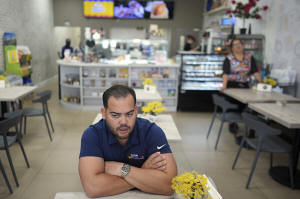US business owners are confused about Venezuelan employees with
temporary status
[May 21, 2025] By
GISELA SALOMON
DORAL, Fla. (AP) — As a business owner in the largest Venezuelan
community in the United States, Wilmer Escaray is stressed and in shock.
He is unsure what steps he should take after the Supreme Court allowed
President Donald Trump to strip legal protections from hundreds of
thousands of Venezuelan immigrants.
Escaray owns 15 restaurants and three markets, most of them in Doral, a
city of 80,000 in the Miami area people known as “Little Venezuela” or “Doralzuela."
At least 70% of Escaray's 150 employees and many of his customers are
Venezuelan immigrants with Temporary Protected Status, also known as TPS.
The Supreme Court on Monday lifted a federal judge’s ruling that had
paused the administration’s plans to end TPS for 350,000 Venezuelans,
potentially exposing them to deportation. The Department of Homeland
Security welcomed the ruling but has given no details on when TPS is
ending and what employers and beneficiaries should do.
“The Trump Administration does not rest on its laurels. We will act in
an expeditious manner,” Tricia McLaughlin, Homeland Security assistant
secretary, said Tuesday in a written response to questions about any
expiration date for TPS after the court ruling and whether work permits
were still valid.
Like many U.S. business owners with Venezuelan employees, Escaray does
not know how long his employees will have legal authorization to work or
whether he will be able to help them.

“The impact for the business will be really hard,” said Escaray, a
37-year-old Venezuelan American who came to the U.S. to study in 2007
and opened his first restaurant six years later. “I don’t know yet what
I am going to do. I have to discuss with my team, with my family to see
what will be the plan.”
TPS allows people already in the U.S. to legally live and work here
because their native countries are deemed unsafe for return due to
natural disaster or civil strife. The Trump administration said
immigrants were poorly vetted after the Biden administration
dramatically expanded the designation.
Immigration attorney Evelyn Alexandra Batista said the Supreme Court did
not specifically address TPS-based work permits, and some work
authorizations remain in effect. She warned, though, that there is no
guarantee that they will remain valid because the Supreme Court could
change this.
“This means that employers and employees alike should be exploring all
other alternative options as TPS was never meant to be permanent,” said
Batista, who has received hundreds of calls from TPS beneficiaries and
companies looking for advice in the months since Trump returned to
office and began his immigration crackdown.
Among the options they are exploring, she said, are visas for people
with extraordinary abilities, for people who make investments and for
agricultural workers.
Many TPS holders have requested asylum or other immigration benefits.
It’s not clear if people with pending requests will be allowed to stay
in the U.S.

[to top of second column] |

Wilmer Escaray talks about his concerns about the future of his
employees and customers during an interview inside a franchise of "Sabor
Venezolano," one of 18 businesses he owns which employ scores of
Venezuelan immigrants with Temporary Protected Status (TPS) who are
now potentially exposed to deportation, in Doral, Fla., Tuesday, May
20, 2025. (AP Photo/Rebecca Blackwell)
 Venezuela President Nicolás Maduro
on Tuesday condemned the withdrawal of TPS for Venezuelan
immigrants.
“TPS was a minimal protection they had. Now it’s been taken away
from them,” Maduro said in a televised government event.
The American Business Immigration Coalition estimates that TPS
holders add $31 billion to the U.S. economy through wages and
spending power. There are no specific estimates of the impact of
Venezuelans, although they make up the largest percentage of TPS
beneficiaries.
They work in hospitality, construction, agriculture, health care,
retail, and food services.
“This decision leaves business owners with limited options,” said
Rebecca Shi, CEO of the coalition.
The concerns go beyond Doral.
William Paredes arrived at the U.S. in 2014 and now owns a window
tinting business that employs four other Venezuelans in Tampa, about
280 miles (450 kilometers) northwest of Miami. He does not know what
is next and he has no plan.
"This is my and my family’s economic support," Paredes, 42, said.
“I’m leaving everything in God’s hands because if I think about it,
I get depressed. We’re in limbo."
He and his wife and son, now 16, came to the U.S. on tourist visas
and soon requested asylum. He lost his asylum case, but thought he
was shield from deportation as a TPS holder. His 8-year-old daughter
was born in the U.S. and is an American citizen.
Paredes was a police officer in his home country and left after
receiving threats for working as a security guard for a mayor who
opposed the ruling socialist party. He said he cannot go back.

"I’m too scared and just thinking that they might send me back to
Venezuela gives me goose bumps," Paredes said.
Escaray, the restaurant owner, said he hopes to find a legal pathway
so his Venezuelan employees can keep working for him. If not, he
said, he might have to fire them.
“I want to keep them to work with us. But we have to respect the
law."
___
Associated Press reporters Jorge Rueda in Caracas, Venezuela, and
Rebecca Santana in Washington contributed.
All contents © copyright 2025 Associated Press. All rights reserved |